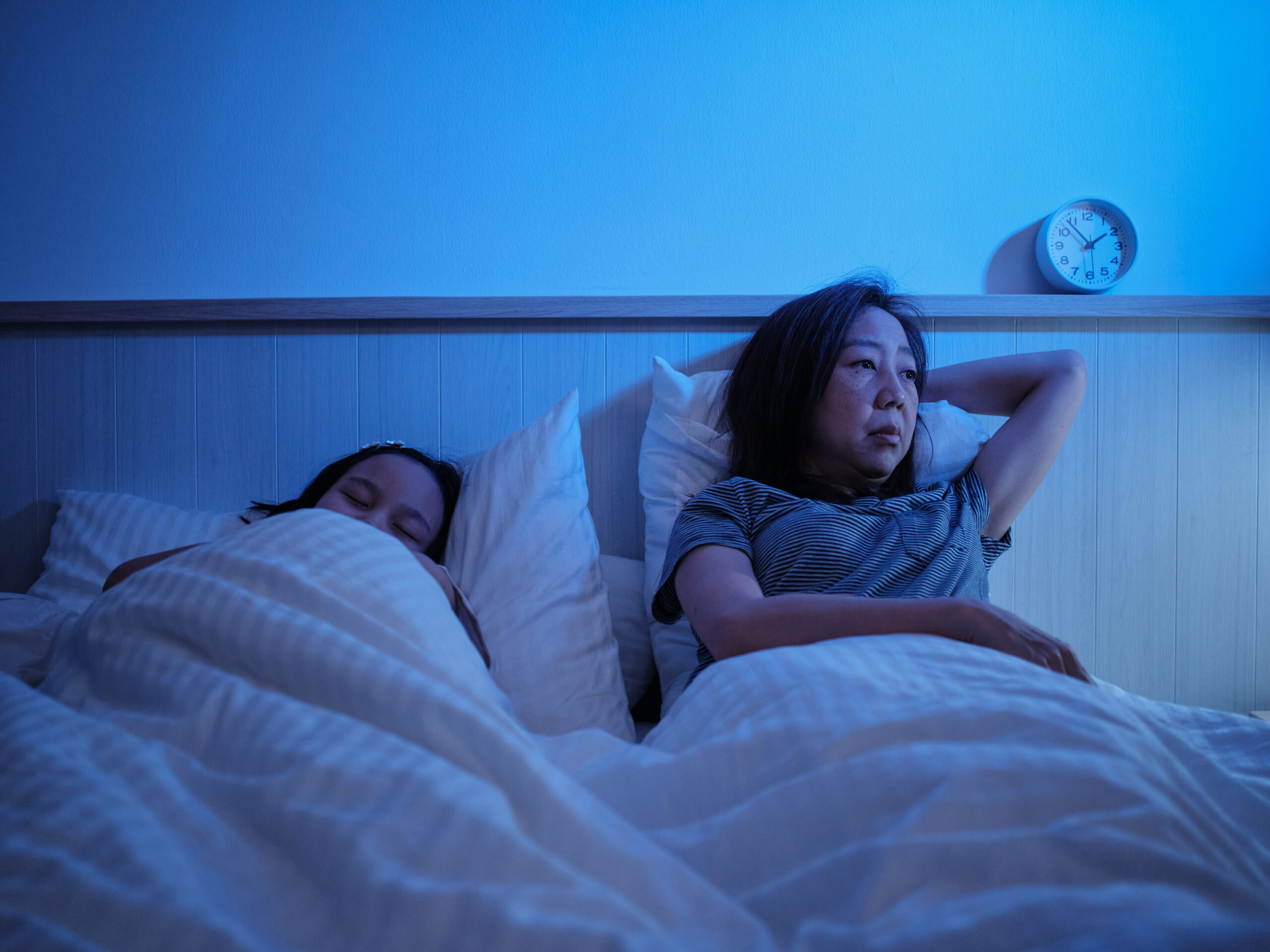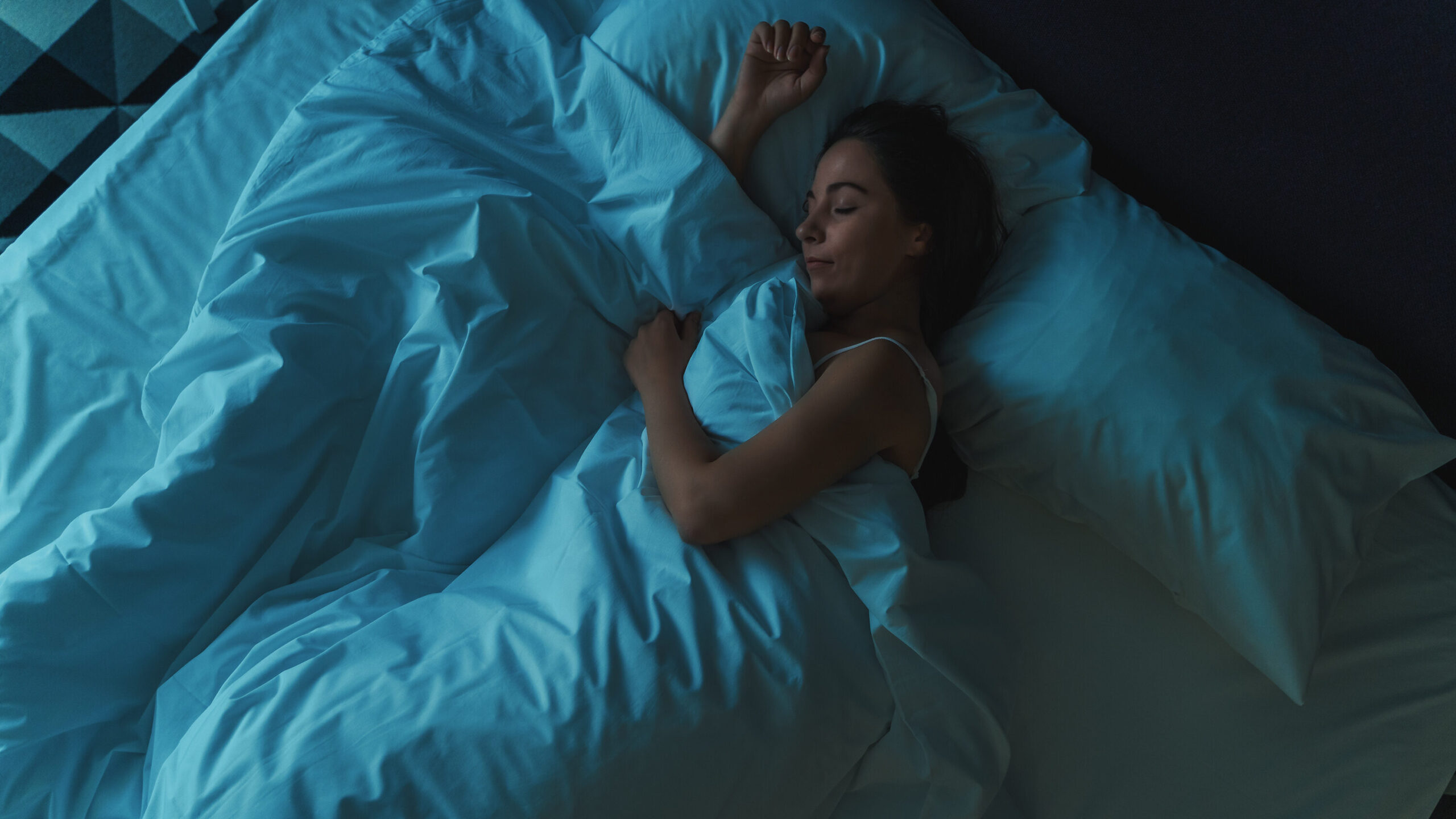Morgan Hagner, PsyD, Post-Doctoral Fellow
Many people find that their anxiety increases or intensifies at night when they’re trying to fall or stay asleep. If you do, too, you’re not alone. According to the American Academy of Sleep Medicine, 68% of people have disruptions to sleep due to anxiety (2024). This specific experience of intensified worry, fear, or unease late in the evening or at bedtime is called nighttime anxiety. Do you have any of these symptoms: racing thoughts, a rapid heartbeat, restlessness, and difficulty falling or staying asleep?

Some people with nighttime anxiety have an anxiety disorder. Others may be experiencing a particularly stressful period of life. Our bodies have biological clocks (circadian rhythms) that influence everything we do. These biological signals regulate our sleep, hunger, hormone levels, and energy levels throughout the day. As the day winds down, these rhythms should signal the body to prepare for rest. However, when we’re alone and it’s quiet and our minds aren’t occupied with distractions, we may focus on what has been stressing us out or on our physical sensations of anxiety. Then our anxiety is likely to intensify.
It’s important to note that anxiety is a normal human emotion. It’s nature’s way of making sure we respond to our stressors—whether they are actual or perceived. Anxiety motivates us and prepares us to focus or take action, such as when we’re competing in a sport, working within a deadline at work or school, or navigating a challenging situation. It’s a part of our fight-or-flight system and is designed to protect us from danger. Usually, anxiety is temporary, tied to specific situations, and fades when the stressor is no longer present. However, anxiety can become a problem when it’s persistent or disproportionate to the situation or when it interferes with our daily life, relationships, functioning, and well-being.
If you’re experiencing nighttime anxiety, here are some evidence-based techniques you can use to relax your body, calm your mind, and get the rest you need.
Sleep Hygiene and Habits
Establishing healthy sleep habits, often referred to as sleep hygiene, can significantly improve your quality and quantity of sleep and reduce nighttime anxiety.:
- Establish a consistent sleep schedule: go to bed and wake up at the time each day, including weekends.
- Engage in daytime activities: build up sleep pressure during the day by getting regular exposure to sunlight, being physically active, and not taking naps past 3pm.
- Create a comfortable sleep space: ensure your bedroom is quiet, cool, and dark, using comfortable bedding and minimizing disruptions.
- Reduce distractions before bed: reduce screen time, avoid clock-watching, and turn off TVs and any other stimulating devices at least 30 minutes before sleep.
- Use the bed for sleep: use the bed for sleep (or intimacy) only. Avoid working, playing games, or using screens in bed.
Reframing Unhelpful Thoughts About Sleep
Sometimes, when we have difficulty falling asleep, we start to have thoughts like, “I’ll never fall asleep” or “If I don’t get a good night’s sleep, I’ll be so tired tomorrow I won’t be able to function.” Thoughts like these fuel the cycle of anxiety and make it even more difficult to fall asleep. Coming up with realistic and helpful responses to common thoughts about sleep can help reduce distress. Here are some examples:
- Old thought: “I’ll never fall asleep.”
- New thought: “I always fall asleep eventually, even if it takes me a while. In the meantime, I can at least rest my body and mind, which is important to do.”
- Old thought: “If I don’t get a good night’s sleep, I’ll be so tired tomorrow I won’t be able to function.”
- New thought: “I’ve been tired before. Even if I don’t sleep well, I usually function at least at a 70% level, so not perfectly but probably well enough.”
Other Techniques
Mindfulness techniques, like focusing your attention on your breath, imagining yourself in a peaceful place, reflecting on what you’re grateful for, or doing a body scan can help you disconnect from worry. And relaxation techniques like progressive muscle relaxation or gentle stretching can help with both physical and mental symptoms of anxiety.

Clinical Insomnia
Insomnia is a common sleep disorder categorized by difficulty falling asleep, staying asleep, or waking too early. It includes additional symptoms like feeling tired throughout the day, feeling cranky, depressed, or anxious, difficulty paying attention, and physical tension. To be diagnosed with clinical insomnia, a person must experience poor sleep quality or quantity that causes significant impairment in daily functioning at least three nights per week for a minimum of three months.
Cognitive Behavior Therapy (CBT) is a well-established, evidence-based treatment for both anxiety and insomnia. Cognitive Behavior Therapy for Insomnia (CBTi) adds an additional component: limiting your time in bed (according to an evidence-based formula) to create a natural “push to sleep” by strengthening your body’s sleep drive—the biological pressure that builds up the longer you’re awake. If you’re experiencing difficulties in sleeping, whether or not nighttime anxiety is involved, try the techniques described in this article. But don’t be surprised if they don’t help enough. You may need a more comprehensive treatment plan with a variety of strategies from a mental health professional who has been well-trained in CBT and CBTi.
Reference:
American Academy of Sleep Medicine. (2024). Sleep prioritization survey: Disrupted sleep and anxiety. https://aasm.org/wp-content/uploads/2025/02/sleep-prioritization-survey-disrupted-sleep-anxiety.pdf